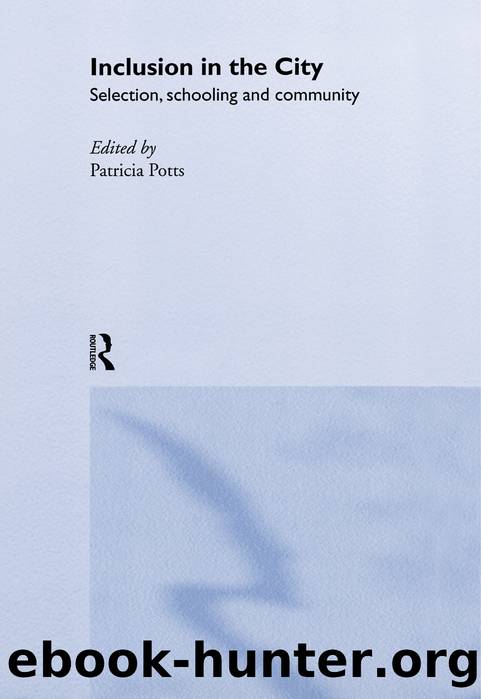Inclusion in the City by Potts Patricia;

Author:Potts, Patricia;
Language: eng
Format: epub
ISBN: 1486743
Publisher: Taylor & Francis Group
THE DEMAND FOR ISLAMIC SCHOOLS
My informants saw the establishment of Islamic schools as a reaction to the failure on the part of state schools to respond to the needs of their children; to respect their identities; to properly include them. The group of six professional women who were instrumental in getting the Islamic primary school off the ground were concerned, according to the head teacher, that âthe structure wasnât there to help our children to develop confidence as Muslimsâ. Some had been through the English state system themselves and wanted their pupils to avoid the shortcomings of their own education. However, when they visited schools they felt that their identities and individuality were still disregarded. In the past teachers âdid not want to knowâ what their needs were; now they made assumptions about their needs before they had got to know them:
âFor example, one particular school ⦠the sort of thing that we heard was âOh, we have a lot of classroom assistants so that we can speak to the child in their home language. I assume that will be either Punjabi or Urdu.â There were assumptions being made ⦠that the child would not be speaking fluent English when they came into school. And also about clothes: âItâs all right to wear a shalwar kameez.â Making assumptions on the basis of the stated religion that they would want to wear a shalwar kameez rather than more Western dress.â
The members of the Muslim Liaison Committee were concerned about their childrenâs lack of progress and low admissions into higher education. In response, the Muslim communities had established a large building to house the weekend classes, which had been running in less suitable accommodation for twelve years, and for âteacher training classes organized by local schoolsâ. They, too, thought low achievement was related to problems of identity, but felt it was blamed â wrongly â on language difficulties: âThe teachers say, âWhat can we do?â This is their second language.â In their experience, the childrenâs use of their mother tongue was diminishing rapidly, and this was particularly evident in the mosque:
âWe have to hire a special imam to come and give a sermon on religion in English because our children do not understand our language. The children who are over twenty-five, they might; but below twenty-five, they donât understand our language.â
Download
This site does not store any files on its server. We only index and link to content provided by other sites. Please contact the content providers to delete copyright contents if any and email us, we'll remove relevant links or contents immediately.
The Art of Coaching Workbook by Elena Aguilar(50181)
Trainspotting by Irvine Welsh(21093)
Twilight of the Idols With the Antichrist and Ecce Homo by Friedrich Nietzsche(18329)
Fangirl by Rainbow Rowell(8823)
Periodization Training for Sports by Tudor Bompa(7950)
Change Your Questions, Change Your Life by Marilee Adams(7411)
This Is How You Lose Her by Junot Diaz(6479)
Asking the Right Questions: A Guide to Critical Thinking by M. Neil Browne & Stuart M. Keeley(5394)
Grit by Angela Duckworth(5328)
Red Sparrow by Jason Matthews(5233)
Paper Towns by Green John(4829)
Room 212 by Kate Stewart(4773)
Ken Follett - World without end by Ken Follett(4473)
The Sports Rules Book by Human Kinetics(4103)
Housekeeping by Marilynne Robinson(4093)
Double Down (Diary of a Wimpy Kid Book 11) by Jeff Kinney(3968)
Papillon (English) by Henri Charrière(3946)
The Motorcycle Diaries by Ernesto Che Guevara(3807)
Exercise Technique Manual for Resistance Training by National Strength & Conditioning Association(3803)
